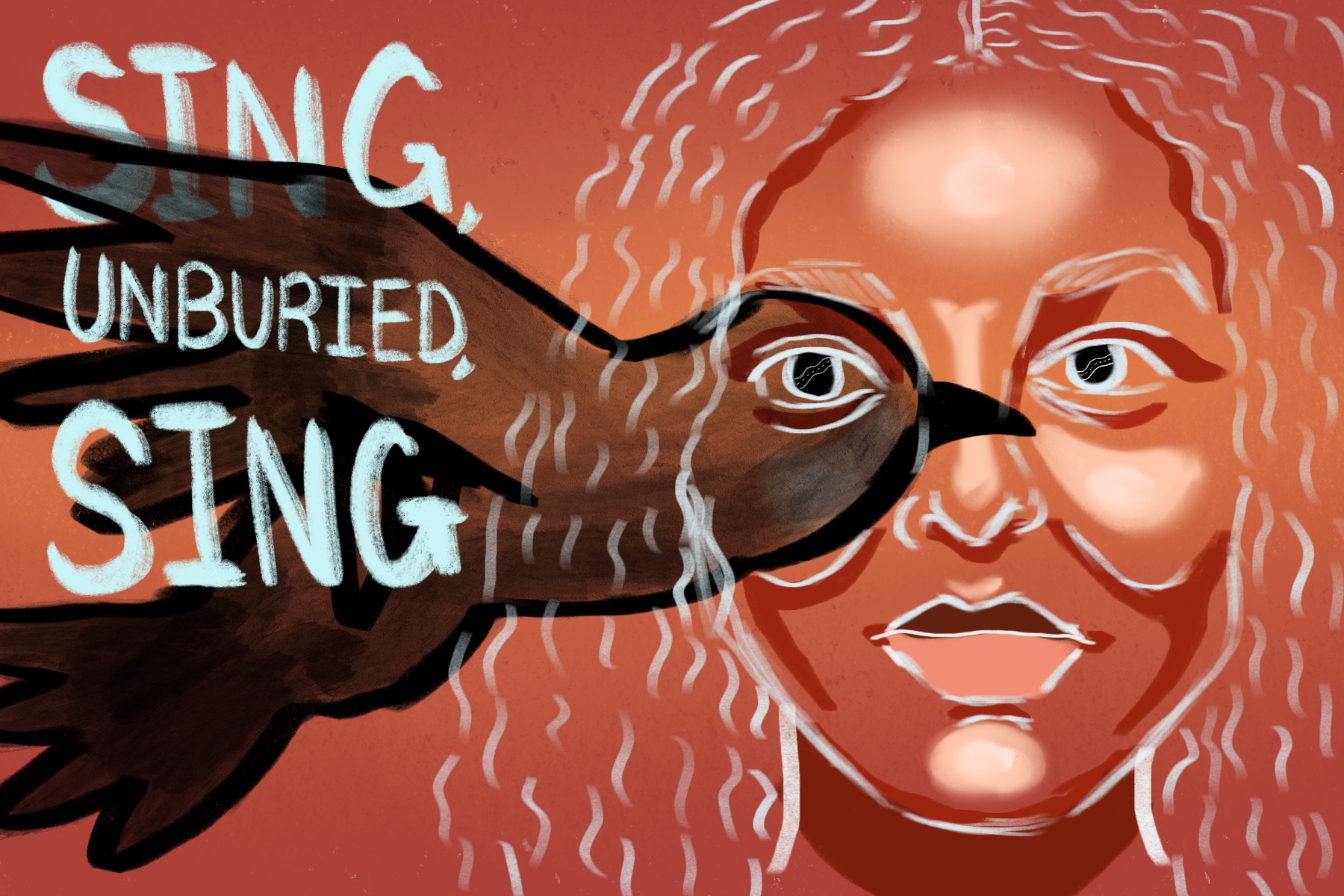This article will be about “Sing, Unburied, Sing” and why its commentary on social issues such as racism and environmentalism are still prevalent today.
Certain novels transcend time with their ability to resonate with audiences over generations. From “The Great Gatsby” to “Of Mice and Men,” we are still being taught by classic pieces of literature today. Despite only being published six years ago, the novel “Sing, Unburied, Sing” by Jesmyn Ward deserves to be a part of the literature hall of fame. Touching on themes of racial inequality and environmental concerns, “Sing, Unburied, Sing” emphasizes that the complexities of the 21st century problems have persisted for generations.
The novel follows the story of a family in rural Mississippi. A drug-addicted mother named Leonie takes her children, Jojo and Kayla, to pick up their father from prison. Leonie’s addiction renders her an inaccessible mother, forcing thirteen-year-old Jojo to take on the responsibility of parenting his three-year-old sister. The book is riddled with themes of racism and mysticism as traumas from the past haunt the present both literally and figuratively.
Leonie’s dad, Pop, is Jojo’s father figure who shares his experience from when he was incarcerated in Parchman Prison. He tells the story of his friend, Richie, who was a twelve-year-old Black boy who suffered a brutal death as a result of racist motives. Later in the novel, Richie’s ghost comes to haunt Jojo and Kayla, demanding answers so he can move on in his past life.
In this case, the haunting portrayed in the novel goes well beyond an attempt to incorporate a spooky plotline. It is a skillful tactic used to demonstrate the idea that our society is still living with traumas from the past. Despite the fact that Richie’s death occurred years before, the Black and biracial characters such as Leonie and Jojo still experience racially motivated attacks.
On their drive back from the prison, they are pulled over by the police and chaos ensues. Leonie swallows a bag of meth so her boyfriend won’t go back to prison, while the policeman drags Jojo out of the car, handcuffs him, and pulls a gun on him.
In Jojo’s case, the only crime that he had committed was being a Black boy with a small bag of trinkets from his grandfather in his pocket. He didn’t deserve to be threatened or attacked, yet the policeman’s racist profile of him forced Jojo to endure a terrifying experience that no child should have to go through.
Even though it is portrayed in a work of fiction, Jojo’s scene with the police echoes many events that we see today. Police brutality only continues to rise and especially targets Black individuals. George Floyd was a Black man killed at the hands of a White police officer in 2020, and despite three years of angered and exhausted protests, nothing has changed. If anything, police killings of Black people have increased, given that they only make up about 14% of the population but are killed at more than twice the rate of White people.
It’s clear that “Sing, Unburied, Sing” resonates deeply with our current society, where current horrific acts are all too reminiscent of the ones in the novel. Engaging in conversations about the novel is crucial to begin fostering a more just humanity. We learn to hold more compassion and understanding about other people’s situations while simultaneously fighting for their equality.
“Sing, Unburied, Sing” also brings to light concerns about the environment. The rural, Southern setting is a depiction of the way environmental degradation disproportionately affects marginalized communities. Nature is deeply embedded within the novel, especially when listening to Pop’s stories about his time spent at Parchman with Richie. When listening to Pop’s experiences, readers see the way that an environment can be manipulated to control a group of people, specifically minorities in this case.
The novel describes how the fictional prison is configured in such a way that it leaves inmates exposed to the harsh climate of the Mississippi Delta, a setup that is eerily similar to southern plantations in the Antebellum South. Considering that Parchman prison is a real penitentiary known for its extremely brutal treatment of inmates, this parallel is eye-opening to the way that weaponized environments can become deadly.
In today’s society, impoverished neighborhoods demonstrate the terrifying probability of indirectly controlling an entire population by subjecting them to uninhabitable living conditions.
How do we expect people to survive when the environment around them is specifically geared to prevent that?
By drawing attention to this issue, Ward is begging readers to take action and begin to recognize the inequalities that begin even before a person leaves their house. Even if they aren’t massive steps, small things like signing petitions, joining protests or donating what you can are all great ways to be involved in the action.
Another small yet key element briefly mentioned in the novel is that Michael, Leonie’s boyfriend and Jojo’s father, worked on British Petroleum’s (BP’s) oil drilling rig Deepwater Horizon when it exploded. The catastrophic event left him scarred for life, a mirror of what many of the actual survivors endure as well.
The real oil spill in 2010 was the biggest in U.S. history, killing eleven people and spilling 4 million barrels of oil in the Gulf of Mexico. By mentioning the awful event, Ward is subtly drawing attention to climate change and the need for better environmental protection policies. Had BP stayed up to date on its safety protocols, rather than taken shortcuts to further its oil production, the destructive spill may have never taken place.
Although BP made promises to become a better and safer company after the explosion, the only progress made over a decade later has been on well containment. This includes creating a better system for storing and channeling oil flow. Employees of the company criticize the Trump administration and Congress for severely impairing the safety and environmental regulations.
It’s hard to fully blame the oil company when the Trump administration reversed or rolled back over 100 environmental rules, attempting to completely dismantle major climate policies. We see yet again that problems of the past have yet to be resolved, and the reasoning for it boils down to society’s refusal to change, many times for political gain.
“Sing, Unburied, Sing” is a testament to the power of literature when provoking thoughtful discussions about the human condition. Our society is still plagued with racism and ever-growing concerns about the environment six years after the novel’s release, making the meaning behind the story even more prevalent. It’s eye-opening to read about such issues in a dramatized way. Readers leave the novel feeling inspired and determined to contribute to the fight for social justice, especially by engaging in meaningful conversations about how the past is still haunting us today.
In its timeless relevance, “Sing, Unburied, Sing” challenges us to consider the ways in which we can become a more compassionate and just society.
“Sing, Unburied, Sing” is available now. Borrow from your local library or buy it from your local bookstore.

















